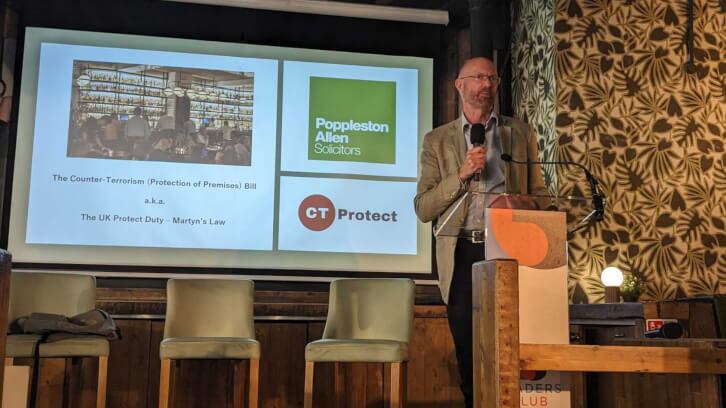Former counter-terrorism national co-ordinator Nick Aldworth told the MA Leaders Club, which took place in Bristol on Wednesday 13 September, the new legislation is expected to be in the King’s Speech on 7 November 2023 with a scheduled entry to debate in parliament in November/December this year.
Martyn’s Law, named after Martyn Hett who was killed in the Manchester Arena terrorist attack in May 2017, will “make publicly accessible locations in the UK, responsible for protecting their staff and customers from terrorist risks, and preparing their staff to respond to incidents that might cause people harm”.
Aldworth said MI5 director general Ken McCallum and FBI director Chris Wray claimed in July 2022: “Our most immediate UK challenge is lone terrorists – Islamist extremist and right-wing extremist – radicalised online, acting at pace, in unpredictable ways.”
Aldworth said the UK became very adept at stopping people travelling abroad to join terrorist groups in circa 2014 but by 2017, people were being radicalised at home and that there is “no safe place anymore”.
He added the cost of terrorism to hospitality is not just the devastation caused at the time of an attack but further closures, chain supply disruptions and a subsequent loss of custom had seen businesses forced to close down.
Recounting two terrorist attacks, in the first, Aldworth explained perpetrators who wore imitation suicide vests, attacked shoppers with bladed weapons and entered restaurants and shops targeting patrons. Armed police arrived in five minutes, shooting and killing the attackers.
Significant business interruption
The primary impact saw 10 people killed and a further 35 injured, including panic-related crush and fall injuries. The mall where it took place was closed for the weekend. The nearby train station was evacuated but reopened later that day with some minor disruption to local public transport. Parts of the mall reopened on following Monday but areas affected by the attack remained closed for five days, causing significant business interruption.
There was some limited damage to furniture and fittings and some stock wastage. The cost of this was £2m.
Meanwhile, in his second example, a vehicle fitted with an IED (improvised explosive device) was parked on a road adjacent to the Tiger Tiger nightclub in Haymarket, London, and was detonated.
The blast killed 80 people and injured more than 500. The immediate infrastructure damage hindered emergency services access and adjacent buildings are so badly damaged, they needed to be demolished and those nearby required substantial repairs.
Significant business interruption followed the rescue, investigation and reconstruction work while the secondary impact saw many local businesses cease trading due to losses and there was significant long-term disruption in the area due to reconstruction work. A dip in tourism and inward investment followed. This came at an estimated financial cost of £50m.
Pubs, bars and nightclubs will be included in Martyn’s Law as qualifying premises, along with a multitude of other sites including shops, sports grounds, hospitals, rail and bus stations, and schools.
Also included will be events, which are either to be held at premises which are not qualifying public premises that are accessible to the public with a capacity of 800 or above.
Standard and enhanced tiers
There will be a two-tier system with the standard tier required for venues with a capacity between 100 and 799 and an enhanced tier for capacities of 800 and above.
Although there will be no need for legislation to sites with a capacity under 100, they will be encouraged to adopt a good practice.
The standard tier will require training so relevant workers – most likely front of house and door staff – must be provided with terrorism protection training in relation to the premises or event.
While evaluation includes a study of the premises, which is reviewed regularly and again when “material changes” occur and revisions must ensure evaluations are kept up to date and a copy of the current evaluation must be made available to each individual who uses the premises as a place of work. The regulator must also receive a copy of the current evaluation on request.
For the enhanced tier, again relevant workers will need to be trained and an assessment includes a knowledge of the types of acts of terrorism that are most likely to occur, the reasonably practicable measures that might be expected to reduce the risk of acts of terrorism and reduce the risk of physical harm to individuals.
A regulator of the system will be empowered to issue penalties, issue improvement notices and close premises and events.
Following the entry to parliament at the end of 2023, Martyn’s Law is expected to gain Royal Assent late in the first quarter of 2024, implemented in 2024 to 2025 with a full enactment by 2026.




